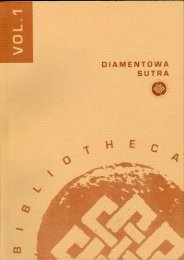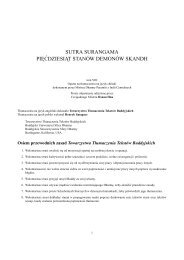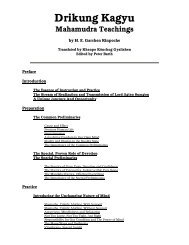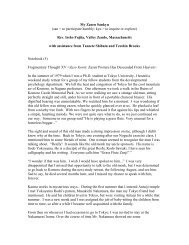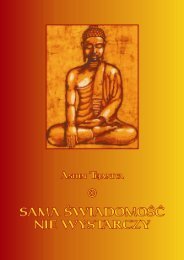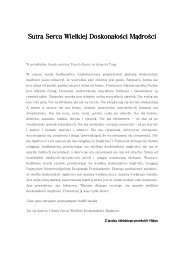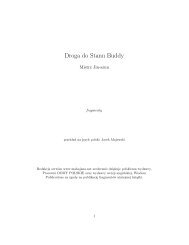3 - Computing in the Humanities and Social Sciences
3 - Computing in the Humanities and Social Sciences
3 - Computing in the Humanities and Social Sciences
Create successful ePaper yourself
Turn your PDF publications into a flip-book with our unique Google optimized e-Paper software.
practices do not share this concern. If communicative <strong>in</strong>teraction occurs at all, <strong>in</strong> fact, it<br />
happens between <strong>the</strong> ascetics <strong>and</strong> <strong>the</strong> div<strong>in</strong>ity he/she addresses <strong>and</strong> with whom he/she<br />
identifies him/herself. In any case, <strong>the</strong> purely communicative-conversational aspect of<br />
mantras is almost completely un<strong>in</strong>fluential <strong>in</strong> <strong>the</strong>ir ritual use.<br />
A sh<strong>in</strong>gon/mantra can be assimilated to an illocutionary expression endowed with<br />
performative function as it produces someth<strong>in</strong>g or concurs <strong>in</strong> transform<strong>in</strong>g reality. This<br />
transformation, however, is not merely <strong>in</strong>corporeal, but dramatically bodily <strong>and</strong><br />
material, s<strong>in</strong>ce it is believe to concern phenomena such as heal<strong>in</strong>g diseases, <strong>the</strong><br />
acquisition of worldly benefits, rebirth <strong>in</strong> paradise or fall <strong>in</strong>to hell, <strong>and</strong> becom<strong>in</strong>g a<br />
buddha. Kakuban for example wrote:<br />
This five-syllable mantra [a bi ra un ken] is <strong>the</strong> general spell of all<br />
buddhas of <strong>the</strong> Ten directions… By chant<strong>in</strong>g it one can be reborn <strong>in</strong> <strong>the</strong><br />
Pure L<strong>and</strong>s of <strong>the</strong> Ten directions, <strong>in</strong> <strong>the</strong> realm of Maitreya [<strong>the</strong> future<br />
Buddha] or <strong>in</strong> <strong>the</strong> cave of <strong>the</strong> Asura, accord<strong>in</strong>g to one’s desire. (Kakuban,<br />
Gor<strong>in</strong> kujimyø himitsu shaku, <strong>in</strong> Miyasaka 1989, ed.: 219).<br />
However, <strong>the</strong>re are several problems with a use, even merely heuristic, of <strong>the</strong><br />
speech acts <strong>the</strong>ory, mostly caused by <strong>the</strong> fact that <strong>the</strong> latter has been conceived to<br />
expla<strong>in</strong> uses of ord<strong>in</strong>ary language that have little <strong>in</strong> common with <strong>the</strong> chant<strong>in</strong>g of<br />
mantras. Let us see some of <strong>the</strong> major difficulties:<br />
(i) whereas for Aust<strong>in</strong> performative expressions are nei<strong>the</strong>r true nor false but simply<br />
correct or <strong>in</strong>correct, sh<strong>in</strong>gon can be pronounced correctly or <strong>in</strong>correctly (<strong>and</strong>, on<br />
<strong>the</strong> basis of this, <strong>the</strong>y will be efficacious or not), but <strong>in</strong> any case <strong>the</strong>y are posited to<br />
be always <strong>and</strong> absolutely true.<br />
(ii) Even though <strong>the</strong> perlocutionary force of sh<strong>in</strong>gon is based, at least <strong>in</strong> part, on<br />
pragmatic decisions (<strong>in</strong> general, an <strong>in</strong>vestment of faith) of <strong>the</strong> perform<strong>in</strong>g subject<br />
<strong>and</strong> on cultural <strong>and</strong> epistemic assumptions, it is believed to function <strong>in</strong> an<br />
essentially automatic <strong>and</strong> necessary way because it is directly related to <strong>the</strong><br />
sh<strong>in</strong>gon’s very nature (<strong>the</strong>ir content <strong>and</strong> <strong>the</strong>ir direct relation with reality).<br />
(iii) Not all participants <strong>in</strong> rituals underst<strong>and</strong> sh<strong>in</strong>gon, also because <strong>the</strong> latter have<br />
an <strong>in</strong>itiatory status: accord<strong>in</strong>g to Aust<strong>in</strong>’s <strong>the</strong>ory, <strong>the</strong>ir utterance would often be<br />
“unfelicitous,” <strong>in</strong>effective. However, it is possible to detect with<strong>in</strong> <strong>the</strong> Sh<strong>in</strong>gon<br />
tradition a tendency to reduce <strong>the</strong> conditions of felicity for mantric acts to <strong>the</strong> sole<br />
38



![Shushogi, Dogen Zenji [PDF] - Mahajana.net](https://img.yumpu.com/50921105/1/190x219/shushogi-dogen-zenji-pdf-mahajananet.jpg?quality=85)

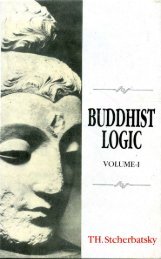
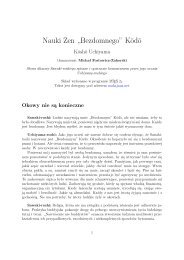
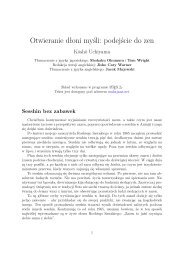
![wywiadu z Murakami Kosho Roshim [PDF] - Buddyzm w Polsce i na ...](https://img.yumpu.com/45809746/1/184x260/wywiadu-z-murakami-kosho-roshim-pdf-buddyzm-w-polsce-i-na-.jpg?quality=85)
